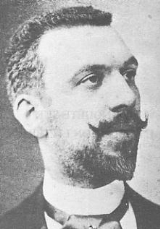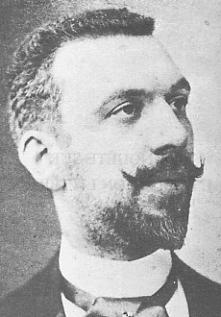
Jules Huret
Encyclopedia

Life
Born to a family of fishermen, he started work aged 15 at the secretariat of the mayor's office at Boulogne, to support his widowed mother. In 1881 he founded a small literary review and four years later came to Paris, finding work there as an editor of scholarly books on the Rive GaucheRive Gauche
La Rive Gauche is the southern bank of the river Seine in Paris. Here the river flows roughly westward, cutting the city in two: looking downstream, the southern bank is to the left, and the northern bank is to the right....
. Entering in 1886 L'Événement of Edmond Magnier, he remained in its employ for 6 months, then worked for several other daily newspapers.
In 1890, Valentin Simond took him on as a regular collaborator on L'Écho de Paris
L'Écho de Paris
L'Écho de Paris was a daily newspaper in Paris from 1884 to 1944.The paper's editorial stance was initially conservative and nationalistic, although it did later become close to the French Socialist Party. Its writers included Octave Mirbeau, Georges Clemenceau, Henry Bordeaux, François Mitterrand,...
. In March 1891, he began his famous "Enquête sur l'évolution littéraire" (Enquiry on literary evolution), in the course of which he interviewed 64 writers, including Émile Zola and his five collaborators on Soirées de Médan, Octave Mirbeau
Octave Mirbeau
Octave Mirbeau was a French journalist, art critic, travel writer, pamphleteer, novelist, and playwright, who achieved celebrity in Europe and great success among the public, while still appealing to the literary and artistic avant-garde...
and Maurice Barrès
Maurice Barrès
Maurice Barrès was a French novelist, journalist, and socialist politician and agitator known for his nationalist and antisemitic views....
, about the state of French literature and their perspectives on it, and on the battle of the "Psychologists
Psychology
Psychology is the study of the mind and behavior. Its immediate goal is to understand individuals and groups by both establishing general principles and researching specific cases. For many, the ultimate goal of psychology is to benefit society...
against the Naturalists
Naturalism (literature)
Naturalism was a literary movement taking place from the 1880s to 1940s that used detailed realism to suggest that social conditions, heredity, and environment had inescapable force in shaping human character...
" and the "Symbolists
Symbolism (arts)
Symbolism was a late nineteenth-century art movement of French, Russian and Belgian origin in poetry and other arts. In literature, the style had its beginnings with the publication Les Fleurs du mal by Charles Baudelaire...
against the Parnassians". The basic proposal of these interviews, which the interviewees had to accept, was that the Darwinian
Charles Darwin
Charles Robert Darwin FRS was an English naturalist. He established that all species of life have descended over time from common ancestry, and proposed the scientific theory that this branching pattern of evolution resulted from a process that he called natural selection.He published his theory...
principal of evolution
Evolution
Evolution is any change across successive generations in the heritable characteristics of biological populations. Evolutionary processes give rise to diversity at every level of biological organisation, including species, individual organisms and molecules such as DNA and proteins.Life on Earth...
could be applied to literature, which was also in certain ways a battlefield in which the fittest survived.
Making a speciality of interviews and practising it to perfection, he reported the spirit of his notable contemporaries with as much tact as efficiency. He moved in 1892 to Le Figaro
Le Figaro
Le Figaro is a French daily newspaper founded in 1826 and published in Paris. It is one of three French newspapers of record, with Le Monde and Libération, and is the oldest newspaper in France. It is also the second-largest national newspaper in France after Le Parisien and before Le Monde, but...
, where the same year he began an "Enquête sur la question sociale en Europe" (Enquiry into the social question of Europe), which took him to Rome
Rome
Rome is the capital of Italy and the country's largest and most populated city and comune, with over 2.7 million residents in . The city is located in the central-western portion of the Italian Peninsula, on the Tiber River within the Lazio region of Italy.Rome's history spans two and a half...
, Vienna
Vienna
Vienna is the capital and largest city of the Republic of Austria and one of the nine states of Austria. Vienna is Austria's primary city, with a population of about 1.723 million , and is by far the largest city in Austria, as well as its cultural, economic, and political centre...
, Zurich
Zürich
Zurich is the largest city in Switzerland and the capital of the canton of Zurich. It is located in central Switzerland at the northwestern tip of Lake Zurich...
, Vienna
Vienna
Vienna is the capital and largest city of the Republic of Austria and one of the nine states of Austria. Vienna is Austria's primary city, with a population of about 1.723 million , and is by far the largest city in Austria, as well as its cultural, economic, and political centre...
, Germany
Germany
Germany , officially the Federal Republic of Germany , is a federal parliamentary republic in Europe. The country consists of 16 states while the capital and largest city is Berlin. Germany covers an area of 357,021 km2 and has a largely temperate seasonal climate...
and Russia
Russia
Russia or , officially known as both Russia and the Russian Federation , is a country in northern Eurasia. It is a federal semi-presidential republic, comprising 83 federal subjects...
. In 1895, under the direction of Antonin Périvier and Fernand de Rodays, Huret saw himself entrusted with Petite chronique des lettres du quotidien (A short report on the letters of the day), then - from 1896 to 1899 - a report on the state of the theatre. From 1902, he made great voyages to foreign lands, sending back several reports. He published enquiries on the United States of America in Le Figaro, which his friend Octave Mirbeau proposed for the prix Goncourt
Prix Goncourt
The Prix Goncourt is a prize in French literature, given by the académie Goncourt to the author of "the best and most imaginative prose work of the year"...
, along with ones on Germany and Argentina and on France's universities, politics, poor, and critics' rights.
Works
- Enquête sur l'évolution littéraire. Conversations avec MM. RenanErnest RenanErnest Renan was a French expert of Middle East ancient languages and civilizations, philosopher and writer, devoted to his native province of Brittany...
, de GoncourtJules de GoncourtJules de Goncourt , born Jules Alfred Huot de Goncourt, was a French writer, who published books together with his brother Edmond.- Works :With Edmond de Goncourt:* Sœur Philomène...
, Émile ZolaÉmile ZolaÉmile François Zola was a French writer, the most important exemplar of the literary school of naturalism and an important contributor to the development of theatrical naturalism...
, Guy de MaupassantGuy de MaupassantHenri René Albert Guy de Maupassant was a popular 19th-century French writer, considered one of the fathers of the modern short story and one of the form's finest exponents....
, HuysmansJoris-Karl HuysmansCharles-Marie-Georges Huysmans was a French novelist who published his works as Joris-Karl Huysmans . He is most famous for the novel À rebours...
, Anatole FranceAnatole FranceAnatole France , born François-Anatole Thibault, , was a French poet, journalist, and novelist. He was born in Paris, and died in Saint-Cyr-sur-Loire. He was a successful novelist, with several best-sellers. Ironic and skeptical, he was considered in his day the ideal French man of letters...
, Maurice BarrèsMaurice BarrèsMaurice Barrès was a French novelist, journalist, and socialist politician and agitator known for his nationalist and antisemitic views....
, etc. (1891) Online text - La Catastrophe du Bazar de la CharitéBazar de la CharitéThe Bazar de la Charité was an annual charity event organized by the French Catholic aristocracy in Paris from 1885 onwards. It is best known for the fire at the 1897 bazaar that claimed 126 lives, many of them aristocratic women, the most notable of whom was Her Royal Highness the Duchess of...
(4 mai 1897). Historique du Bazar de la charité, la catastrophe. Documents recueillis et mis en ordre par Jules Huret (1897) Online text - Enquête sur la question sociale en Europe (1897) Online text
- Sarah Bernhardt (1899)
- Loges et coulisses (1901) Online text
- Tout yeux, tout oreilles (1901) Online text
- Les Grèves. Enquête au Creusot, à Lille, Roubaix, Anzin, Lens, Marseille, Carmaux, Lyon, Saint-Étienne, Saint-Chamond (1902)
- En Amérique. De New-York à la Nouvelle-Orléans (1904) Online text
- En Amérique. De San Francisco au Canada (1905)
- En Allemagne. Rhin et Westphalie : prospérité, les villes, les ports, usiniers et philanthropes, les grands syndicats patronaux (1907) Online text
- En Argentine (2 volumes, 1911–1913) Online text
- En Allemagne. BerlinBerlinBerlin is the capital city of Germany and is one of the 16 states of Germany. With a population of 3.45 million people, Berlin is Germany's largest city. It is the second most populous city proper and the seventh most populous urban area in the European Union...
(1913) - Rothschild et la question sociale (1920) Online text
- Correspondance Octave MirbeauOctave MirbeauOctave Mirbeau was a French journalist, art critic, travel writer, pamphleteer, novelist, and playwright, who achieved celebrity in Europe and great success among the public, while still appealing to the literary and artistic avant-garde...
-Jules Huret (2009).

